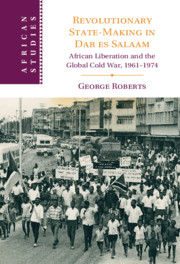Book contents
- Revolutionary State-Making in Dar es Salaam
- African Studies Series
- Revolutionary State-Making in Dar es Salaam
- Copyright page
- Contents
- Maps
- Acknowledgements
- Abbreviations
- Introduction
- 1 The Making of a Cold War City in Eastern Africa
- 2 Revisiting the Politics of the Arusha Declaration
- 3 Dilemmas of Non-Alignment: Tanzania and the German Cold War
- 4 The Assassination of Eduardo Mondlane: Mozambican Revolutionaries in Dar es Salaam
- 5 Tanzania’s ’68: Cold War Interventions, Youth Protest, and Global Anti-Imperialism
- 6 Decolonising the Media: Press and Politics in Revolutionary Dar es Salaam
- 7 Mwongozo: The African Revolution, Reloaded
- Conclusion
- Bibliography
- Index
- African Studies Series
6 - Decolonising the Media: Press and Politics in Revolutionary Dar es Salaam
- Revolutionary State-Making in Dar es Salaam
- African Studies Series
- Revolutionary State-Making in Dar es Salaam
- Copyright page
- Contents
- Maps
- Acknowledgements
- Abbreviations
- Introduction
- 1 The Making of a Cold War City in Eastern Africa
- 2 Revisiting the Politics of the Arusha Declaration
- 3 Dilemmas of Non-Alignment: Tanzania and the German Cold War
- 4 The Assassination of Eduardo Mondlane: Mozambican Revolutionaries in Dar es Salaam
- 5 Tanzania’s ’68: Cold War Interventions, Youth Protest, and Global Anti-Imperialism
- 6 Decolonising the Media: Press and Politics in Revolutionary Dar es Salaam
- 7 Mwongozo: The African Revolution, Reloaded
- Conclusion
- Bibliography
- Index
- African Studies Series
Summary
What was the relationship between a revolutionary African state and the postcolonial media? This chapter analyses the evolution of the press in Dar es Salaam after independence. By the mid-1970s, Tanzania had just two national daily newspapers, one of which was owned by the party, the other by the state. But this was not the outcome of a teleological slide from an independent to a muzzled media, as liberal Cold War-era conceptions of the ‘freedom of the press’ would have it. This chapter shows how the press became a contested site of socialist politics in Dar es Salaam’s internationalised media world. Stakeholders debated questions of who should own newspapers, who should work for them, and what they should write in them. Even when the government nationalised the country’s only independent English-language newspaper, it placed it under the control of a radical, foreign editor and emphasised the need for it to serve as a critical voice. However, when this editorial independence transgressed Tanzania’s foreign policy, the state moved to bring the press under closer control, justified by Third World trends towards ‘development media’.
- Type
- Chapter
- Information
- Revolutionary State-Making in Dar es SalaamAfrican Liberation and the Global Cold War, 1961–1974, pp. 203 - 236Publisher: Cambridge University PressPrint publication year: 2021



